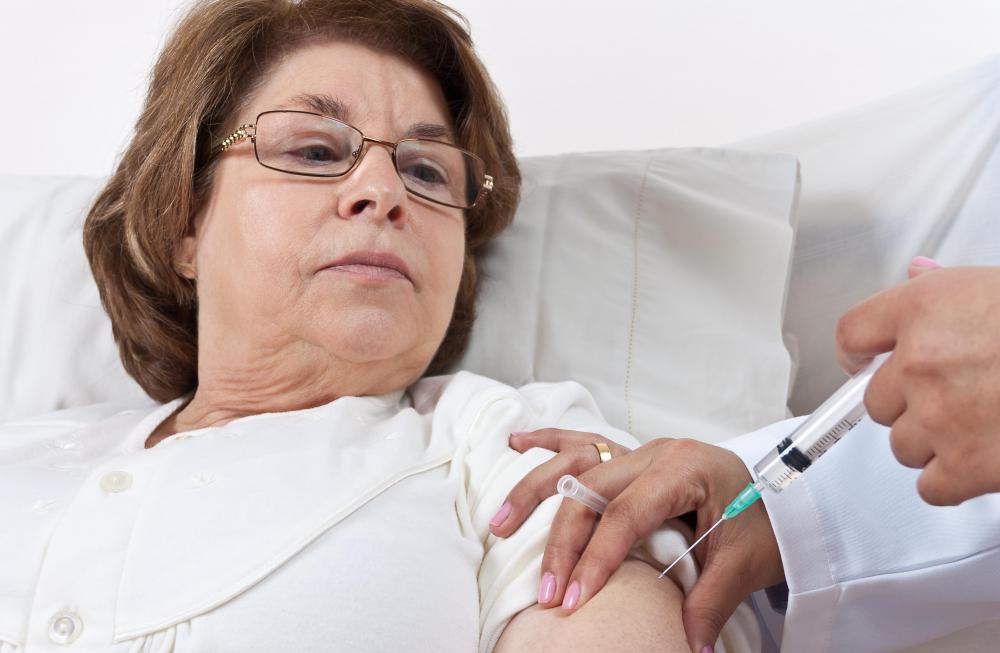At WiseGEEK, we're committed to delivering accurate, trustworthy information. Our expert-authored content is rigorously fact-checked and sourced from credible authorities. Discover how we uphold the highest standards in providing you with reliable knowledge.
What are the Common Causes of an Absence of Menstruation?
The most common cause for the absence of menstruation, known medically as amenorrhea, is pregnancy. Other physical reasons a woman of reproductive age may miss her period are illness, weight loss, and weight gain. Contraceptives that introduce artificial hormones to the body, such as birth control pills, patches, and shots, can cause an absence of menstruation. A woman’s psychological state, especially extreme stress, can sometimes explain an absence of menstruation.
Menstruation occurs when the lining of the uterus is shed each month. This lining develops after ovulation to receive a fertilized egg. When pregnancy occurs, the lining remains in place, and the woman doesn’t have her period. If a woman is breastfeeding, she may have an absence of menstruation because the lining of the uterus isn't shed. Despite not having a period, the woman may ovulate and could become pregnant while breastfeeding.

The use of hormonal birth control often causes an absence of menstruation because these contraceptives are designed to suppress ovulation. When a woman’s body doesn’t ovulate, there is no monthly period because the lining of the uterus is not shed. The woman usually begins ovulating and having her regular periods again within a couple months of stopping hormonal birth control usage.

Physicians define two types of amenorrhea. If a girl hasn’t started her period by age 16, this is referred to as primary amenorrhea. When a woman who has had her period before has an absence of menstruation for one or more months, physicians refer to this condition as secondary amenorrhea.
Other causes of secondary amenorrhea include medications such as antidepressants, steroids, and chemotherapy. Athletes and women with eating disorders may also be prone to an absence of menstruation. Ovulation will often not occur when a woman weighs too little or has extreme physical stress, such as the physical stress endured by athletes who are training. If ovulation doesn’t occur, there is no period.

An absence of menstruation may also occur as a woman nears menopause. During the time known as peri-menopause, a woman’s body is transitioning from its reproductive years to the time when ovulation will no longer occur. During peri-menopause, the menstrual cycle may be irregular, and there may be months in a row when the woman doesn’t menstruate.
In the case of primary amenorrhea, causes can include chromosomal, hypothalamus, and pituitary disorders. The girl may have been born with abnormalities in her uterus, cervix, or other reproductive organs that keep her from ovulating or menstruating. Anorexia, Cushing’s disease, and obesity may also be the cause of primary amenorrhea.
AS FEATURED ON:
AS FEATURED ON:

















Discussion Comments
@literally45-- I'm not an expert on this topic but I think that there are birth control pills that allow a woman to get a period once every three months. I don't know the details about how they work or how the medication is taken, but they're available.
You should talk to your doctor about the various types of birth control medications, how they affect menstruation and which is best for you. The pills that stop menstruation altogether are the most commonly used. They contain hormones which makes the body think it's pregnant. That's why ovulation and menstruation doesn't occur. Just as the absence of menstruation during pregnancy.
Are there birth control pills that allow women to have menstruation but still prevent pregnancy?
A friend of mine in school suffers from anorexia. She has many problems because of it, including issues with her reproductive system. She doesn't get periods at all. She also has hair loss and really dry skin and brittle nails. She is receiving help now. She is at a center where they are teaching her to eat again. I hope she becomes healthy again soon.
Post your comments